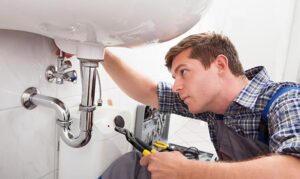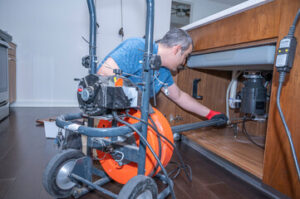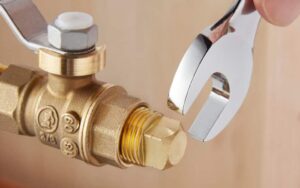
Plumbing systems provide a large variety of services to buildings and their occupants. Taking simple steps to maintain plumbing can reduce repair costs and the risk of water damage.
Neglecting even minor plumbing issues can lead to costly problems like mold growth, sagging ceilings, and sunken floorboards. Plumbing maintenance can prevent these issues and keep the building running as efficiently as possible. To learn more, contact your local Plumber West Covina today.
Maintaining Water Pressure
A sudden drop in water pressure can throw off a number of daily tasks. From showering to washing dishes and watering your lawn, low water pressure can impact everything you use in your home or business. The good news is that catching problems early with routine plumbing maintenance can help minimize the inconvenience of a sudden loss in pressure and prevent costly repairs.
Leaks are the number one cause of poor water pressure in homes and businesses. Even small leaks waste a lot of water over time, making your fixtures and appliances work harder and increasing your water bill. Keeping an eye on your water usage and bills can also help you identify and repair hidden leaks before they become major problems.
Older pipes are also more susceptible to leaks and corrosion. Having your plumbing system inspected and upgrading to newer pipes when needed can reduce the risk of poor water pressure and keep your home or business running efficiently.
If you notice that your water is less than pristine, regularly cleaning or replacing faucet aerators can help maintain consistent flow. Additionally, having a water softener installed can help reduce the amount of minerals and other contaminants that build up in your pipes and fixtures.
When you’re groggy in the shower and need that invigorating rush of water to jumpstart your day, nothing is more frustrating than a weak jet of water. Weak flow in your showers, sinks, and spigots can affect your enjoyment of daily activities and lead to more serious plumbing problems if left unchecked. Investing in regular plumbing inspections can help prevent these issues and catch problems as they develop, helping you avoid costly repairs in the future.
Checking Your Toilet
A leaky toilet is one of the most common causes of water waste in the home. A single leak can go undetected for months and cost you hundreds of dollars a year in utility bills. The good news is that this type of toilet problem is fairly easy to fix.
Begin by shutting off the water supply valve to the toilet tank. Then, flush the toilet to drain and clean the valve seat. Next, replace the flapper valve. You can purchase a new flapper valve at a hardware store or even some large grocery stores. If you have trouble locating the right replacement flapper valve, ask the person who originally fitted it for help free of charge.
If you notice a brown or yellow ring around the base of your toilet that won’t go away after rigorous cleaning, it is likely due to a loose connection between the toilet tank and the bowl. This symptom may be the result of a broken seal and should be repaired as soon as possible.
You should also check the water level in your toilet’s tank. There should be a line on the inside of the tank that indicates the optimal water level. If you find that the water level is lower than this, it could indicate a faulty flapper that’s not creating a tight enough seal.
Other signs of a leaking toilet include the sound of a running toilet or a puddle on the floor of your bathroom. You can test the flapper’s ability to create a tight seal by dropping food coloring into the tank. If the color appears in the toilet bowl after 15 to 20 minutes, it means the flapper isn’t sealing well.
A leaking toilet that doesn’t produce the normal flushing sounds can cause “phantom flushes,” which make your toilet run longer than necessary and waste water without you knowing it. You can also test the float by shutting off the water supply before you go to bed at night and leaving it unattended for several hours. If you find that the water in the tank is significantly lower than it was when you turned off the water, it’s time to replace the float and the chain or rod that connects it to the handle.
Inspecting Your Pipes
Inspecting pipes is one of the most important parts of plumbing maintenance. A professional plumber will assess the condition of pipes using a variety of techniques such as sonic testing, magnetic particle inspection, and Charpy impact tests. They will also check for corrosion and signs of leaks. Leaking pipes can cause severe problems such as low water pressure, and if not addressed, they can lead to expensive repairs or property damage.
The condition of drains and toilets is another crucial part of a plumbing inspection. Plumbers will look for issues such as gurgling sounds and strange odors, which could indicate a problem with the venting system or clogged pipes. They will also check if the water shut-off valves are working and ensure that the supply lines below sinks are unobstructed.
If a plumbing problem is left unchecked, it can lead to other problems such as flooding, mold growth, and structural damage. It’s best to catch plumbing problems early on before they become serious, which is why it’s important to schedule a plumbing inspection at least once every two years. A professional plumber will be able to spot a small leak that you might miss, which can then turn into a major plumbing disaster.
Another reason why a plumbing inspection is so important is that it will help you save money on your energy bills. For example, a leaking toilet can waste as much as 30 gallons of water per day. A plumber can assess your piping and recommend water-saving fixtures to keep your costs down.
Plumbing maintenance is an essential part of building and facility maintenance, and it should be a priority for everyone. A routine plumbing inspection can help you catch a lot of problems before they become costly, so it’s worth investing in an experienced plumber to perform a thorough assessment of your property or building. Using SAWIN service agreement software, you can create new maintenance memberships or equipment-based contracts, apply discounts, and customize agreements with ease. You can also use our back office to produce recurring service material reports and track labor and parts to ensure that you meet contracted services.
Cleaning Your Drains
Keeping your drains clean is important for the overall health of your plumbing system. It prevents the buildup of materials that can cause blockages and other problems, including unpleasant odors, unhealthy mold growth, and even flooding. In addition to preventing the buildup of hair, soap scum, grease, food waste, and other materials that can block your drains, regular cleaning can also help you avoid costly repair bills.
A common sign that your drains need cleaning is when water starts to drain more slowly than usual. This can happen in sinks, showers, tubs, or toilets. This is usually caused by a buildup of material that has been accumulating over time. It can be very difficult to clear this material without professional help.
Another way to tell that your drains need cleaning is when you hear strange squeaking noises coming from inside your home’s pipes. These sounds are most often a result of a buildup of material that is scraping against the inside of your pipes as it moves down the drain. This is a very dangerous situation and should be dealt with immediately.
It’s recommended that you get your drains cleaned professionally at least once a year. This can be done by a professional plumber or you can do it yourself using specialized tools. To keep your drains clean between professional cleanings, you can use a variety of home remedies. For example, you can pour a mixture of baking soda and vinegar down your drains to break up any buildup. This mixture is safe and effective, and it won’t damage your pipes like some store-bought chemical formulas can.
If you’re serious about preventative maintenance, you can place a screen or drain cover over your kitchen and bathroom drains to help keep out hair, soap scum, and other material. This is an inexpensive and effective solution that will save you money in the long run by reducing the need for professional drain cleaning services.
A final thing to keep in mind is that if you notice any signs of a clogged drain or pipe, it’s best to call a plumber right away. A clogged drain or pipe can quickly turn into a plumbing disaster, so it’s always better to be safe than sorry!




